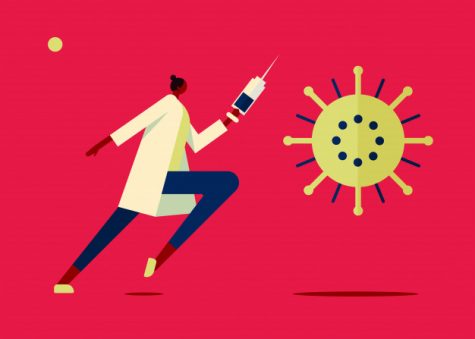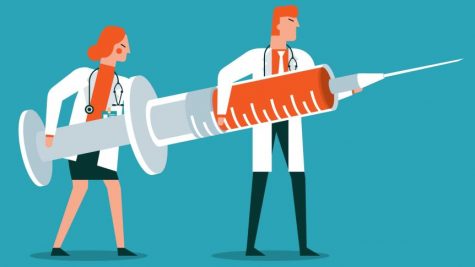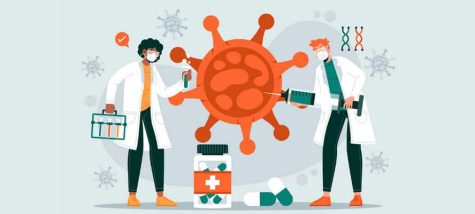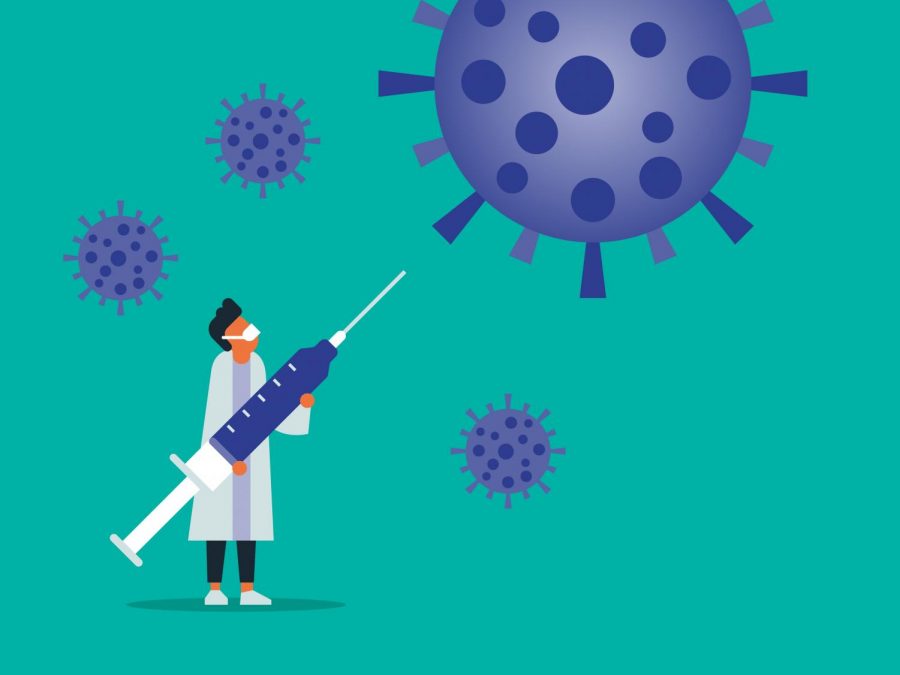Benefits of the Johnson & Johnson Vaccine
On Saturday, February 27th, the United States Food and Drug Administration issued emergency use authorization for a third COVID-19 vaccine: Janssen Pharmaceutica’s Johnson & Johnson vaccine.
Unlike the Pfizer-BioNTech and Moderna vaccines which are based on mRNA technology, this vaccine employs double-stranded DNA. Compared to the two vaccines authorized in December, the Johnson & Johnson vaccine offers significant advantages, and its authorization, due to the reasons outlined below, is a key turning point for the pandemic.
Benefit #1: Requires Only a Single Shot
 Unlike the Pfizer-BioNTech vaccine which requires a three-week interim between the two doses and the Moderna vaccine which requires a four-week interim between the two doses, the newly authorized Johnson & Johnson vaccine requires only one shot. This is a significant advantage in that it increases the likelihood that people will sign up to receive the vaccine, as a single dose is less of a time commitment. In addition, a single dose eliminates the logistical complications of scheduling a second dose and ensuring that the second dose is given to the right person. If a patient is given the first dose of either Pfizer-BioNTech or Moderna vaccine and decides not to return for the second dose, what occurs is an escape variant. If someone were to be infected with COVID-19 after receiving the first dose, a mutant version of the SARS-CoV-2 virus may emerge with the ability to shake off a person’s immune response. This could potentially result in a devastating wave of infections and deaths by the spread of a new SARS-CoV-2 variant. Thus, in order to prevent the occurrence of an escape variant, it is of the utmost importance to deliver the second dose to whoever may have received the first dose of the Pfizer-BioNTech or Moderna vaccines. The advantage of the Johnson & Johnson vaccine is that it requires only a single dose, decreasing the likelihood of the emergence of an escape variant. An additional advantage of a single shot is that this vaccine can be more easily delivered in rural areas, underdeveloped countries, and/or countries with less well-developed distribution systems.
Unlike the Pfizer-BioNTech vaccine which requires a three-week interim between the two doses and the Moderna vaccine which requires a four-week interim between the two doses, the newly authorized Johnson & Johnson vaccine requires only one shot. This is a significant advantage in that it increases the likelihood that people will sign up to receive the vaccine, as a single dose is less of a time commitment. In addition, a single dose eliminates the logistical complications of scheduling a second dose and ensuring that the second dose is given to the right person. If a patient is given the first dose of either Pfizer-BioNTech or Moderna vaccine and decides not to return for the second dose, what occurs is an escape variant. If someone were to be infected with COVID-19 after receiving the first dose, a mutant version of the SARS-CoV-2 virus may emerge with the ability to shake off a person’s immune response. This could potentially result in a devastating wave of infections and deaths by the spread of a new SARS-CoV-2 variant. Thus, in order to prevent the occurrence of an escape variant, it is of the utmost importance to deliver the second dose to whoever may have received the first dose of the Pfizer-BioNTech or Moderna vaccines. The advantage of the Johnson & Johnson vaccine is that it requires only a single dose, decreasing the likelihood of the emergence of an escape variant. An additional advantage of a single shot is that this vaccine can be more easily delivered in rural areas, underdeveloped countries, and/or countries with less well-developed distribution systems.
Benefit #2: Can Be Stored at Refrigerator Temperatures
The Johnson & Johnson vaccine is an adenovirus-based vaccine, which is important in that DNA is not as fragile as RNA. The adenovirus’s tough protein coat works to protect the genetic material held within. As a result, the Johnson & Johnson vaccine can be refrigerated for up to three months at refrigerator temperatures, 36ºF to 46°F (2ºC to 8ºC). This contrasts the Pfizer-BioNTech and Moderna vaccines which must be stored in an ultra-cold freezer between -112°F and -76°F (-80°C and -60°C). Once removed from the ultra-cold freezer, it can be stored in a refrigerator, 36ºF to 46°F (2ºC to 8ºC), for a maximum of five days. If the vaccine is not used after five days, it gets thrown away which has resulted in thousands of vaccine doses going to waste. The Johnson & Johnson vaccine’s ability to be stored at refrigerator temperatures for nearly three months will prove a significant advantage to more rural and less-developed areas of our world that do not have the ability to provide ultra-cold freezer storage units.
Benefit #3: Efficacy
 In the clinical trials, the Johnson & Johnson vaccine had a 66% efficacy rate against COVID-19 in the United States. This may seem like a stark contrast when compared to Pfizer-BioNTech’s 95% efficacy rate and Moderna’s 94.1% efficacy rate. However, there are important factors to be considered. 28 days after the Johnson & Johnson vaccine had been administered, there were zero hospitalizations and zero deaths — those who came down with COVID-19 had only mild cases. The trial data showed 77% efficacy in reducing cases occurring 14 days after vaccination and 85% efficacy for cases 28 days after vaccination. So in essence, even if one catches COVID-19 after receiving the Johnson & Johnson vaccine, the illness resulting from the viral infection will be significantly reduced. In addition, the Pfizer-BioNTech and Modera vaccine trials are not directly comparable to the Johnson & Johnson vaccine trials. The Pfizer-BioNTech and Modera vaccine trials were conducted earlier when fewer and probably less dangerous virus variants were existent which resulted in a higher efficacy rate. At an interview regarding the Johnson & Johnson vaccine, Dr. Anthony Fauci said not to “get caught up, necessarily, on the number game, because it’s a really good vaccine, and what we need is as many good vaccines as possible. Rather than parsing the difference between 94 and 66, accept the fact that now you have three highly effective vaccines. Period.”
In the clinical trials, the Johnson & Johnson vaccine had a 66% efficacy rate against COVID-19 in the United States. This may seem like a stark contrast when compared to Pfizer-BioNTech’s 95% efficacy rate and Moderna’s 94.1% efficacy rate. However, there are important factors to be considered. 28 days after the Johnson & Johnson vaccine had been administered, there were zero hospitalizations and zero deaths — those who came down with COVID-19 had only mild cases. The trial data showed 77% efficacy in reducing cases occurring 14 days after vaccination and 85% efficacy for cases 28 days after vaccination. So in essence, even if one catches COVID-19 after receiving the Johnson & Johnson vaccine, the illness resulting from the viral infection will be significantly reduced. In addition, the Pfizer-BioNTech and Modera vaccine trials are not directly comparable to the Johnson & Johnson vaccine trials. The Pfizer-BioNTech and Modera vaccine trials were conducted earlier when fewer and probably less dangerous virus variants were existent which resulted in a higher efficacy rate. At an interview regarding the Johnson & Johnson vaccine, Dr. Anthony Fauci said not to “get caught up, necessarily, on the number game, because it’s a really good vaccine, and what we need is as many good vaccines as possible. Rather than parsing the difference between 94 and 66, accept the fact that now you have three highly effective vaccines. Period.”
Benefit #4: Low Production Cost
The cost to produce the Johnson & Johnson vaccine is significantly less than the cost to produce either the Pfizer-BioNTech and Moderna vaccines. It costs $10 per dose of the Johnson & Johnson vaccine, while the Pfizer-BioNTech vaccine costs $19.50 per dose and the Moderna vaccine costs $25 to $37 per dose. Since both the Pfizer-BioNTech and Moderna vaccines require two doses, the total cost of the Pfizer-BioNTech vaccine costs around $39 per person, and the Moderna vaccine costs around $50–$74 per person. There is also an added labor cost of producing and administering second doses. Thus, the $10 production cost of the Johnson & Johnson vaccine provides a highly significant advantage to the United States vaccine rollout.
Benefit #5: Can Be Used a Substitute Second Dose of Pfizer-BioNTech or Moderna’s Vaccine
People who have experienced an anaphylactic reaction, a severe allergic reaction, as a result of either Pfizer-BioNTech or Moderna’s first dose vaccine are able to take the Johnson & Johnson vaccine as a substitute for their second dose. Many of those with anaphylaxis reacted to the lipid nanoparticle, which is the main component in the vaccine used to package the mRNA. Since the Johnson & Johnson vaccine uses double-stranded DNA, which is more stable than mRNA, it does not employ the use of a lipid nanoparticle. This reduces the chance of an anaphylactic reaction resulting from the Johnson & Johnson vaccine. On Monday, March 1st the CDC announced that “patients who exhibited an allergic reaction to the Pfizer or Moderna vaccine can get the Johnson & Johnson vaccine for their second round.” This would reduce the chance of an escape variant emerging from those who received the first dose of the Pfizer-BioNTech and Moderna vaccine and choose not to receive the second dose for the fear of an allergic and/or life-threatening reaction.
Benefit #6: Increase in United States Vaccine Stock
 Janssen Pharmaceutica has pledged to provide the United States with 100 million doses of the Johnson & Johnson vaccine by the end of June. When combined with the 600 million doses from the two-shot vaccines made by Pfizer-BioNTech and Moderna expected to be provided by the end of July, there will be more than enough shots to cover any American adult who wants to receive a vaccine. On a similar timeline, Tuesday, March 2nd saw President Joe Biden’s announcement that the United States will have enough vaccines for every adult by the end of May. Whether it’s by the end of May or the end of July, having vaccines for every American adult will be a major turning point for our country.
Janssen Pharmaceutica has pledged to provide the United States with 100 million doses of the Johnson & Johnson vaccine by the end of June. When combined with the 600 million doses from the two-shot vaccines made by Pfizer-BioNTech and Moderna expected to be provided by the end of July, there will be more than enough shots to cover any American adult who wants to receive a vaccine. On a similar timeline, Tuesday, March 2nd saw President Joe Biden’s announcement that the United States will have enough vaccines for every adult by the end of May. Whether it’s by the end of May or the end of July, having vaccines for every American adult will be a major turning point for our country.
Is the Johnson and Johnson Vaccine Morally Wrong?
Although this is not a particular benefit of the vaccine, it is important to include the intense debate surrounding the supposed morality of the Johnson & Johnson vaccine. The Archdiocese of New Orleans and the U.S. Conference of Catholic Bishops has told Catholics not to take the Johnson & Johnson vaccine and to, instead, choose the Pfizer-BioNTech or Moderna vaccine. Their reasoning, Janssen Pharmaceutica used stem cells derived from an aborted fetus to develop their Johnson & Johnson vaccine.
There is a debate in the Catholic Church about whether vaccines and treatments that use fetal tissue should be accepted. This debate focuses on the use of cells cloned from an aborted fetus from the early 1970s. The cells in current use, including the cells used by Janssen Pharmaceutica to develop their vaccine, are not from the original fetal tissue. They are, simply, clones of the original fetal tissue. This recommendation starkly contradicts that of the Vatican and Pope Francis who, in December, said all “vaccines that have used cell lines from aborted fetuses in their research and production process are morally acceptable.” The Vatican said that the vaccine “can be used in good conscience” given the severity of the global pandemic and because the connection to the original aborted fetus is remote. As some religious houses of worship double as vaccination centers, the recommendation to avoid the Johnson & Johnson vaccine may deter some vaccination centers from administering this single-shot vaccine. In a time where people need to be vaccinated as quickly as possible, this may prove a hindrance to the vaccine rollout effort.

Siona Manocha, a senior, has attended Keystone School since kindergarten. Through The Keynote, Siona employs the use of visual art and media to highlight...

